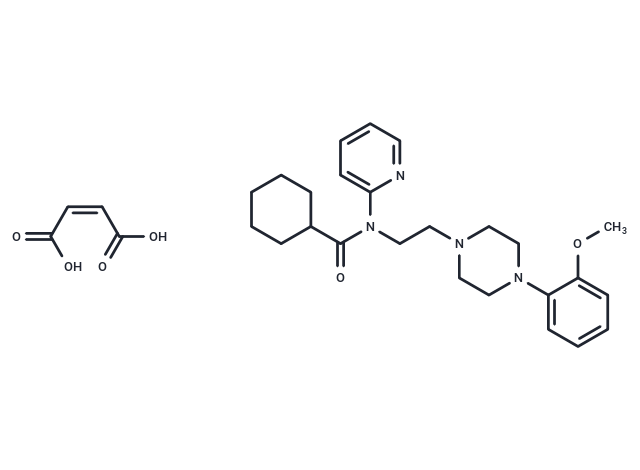Shopping Cart
- Remove All
 Your shopping cart is currently empty
Your shopping cart is currently empty

WAY-100635 maleate is a selective 5-hydroxytryptamine 1A receptor antagonist with an IC50 value of 0.91 nM and a Ki value of 0.39 nM. It is also a dopamine D4 receptor agonist with pIC50 values of 8.9 and 6.6 for 5-HT1A and α1-adrenergic, respectively.

| Pack Size | Price | Availability | Quantity |
|---|---|---|---|
| 2 mg | $38 | In Stock | |
| 5 mg | $61 | In Stock | |
| 10 mg | $96 | In Stock | |
| 25 mg | $189 | In Stock | |
| 50 mg | $351 | In Stock | |
| 100 mg | $522 | In Stock | |
| 200 mg | $755 | In Stock | |
| 500 mg | $1,170 | In Stock | |
| 1 mL x 10 mM (in DMSO) | $72 | In Stock |
| Description | WAY-100635 maleate is a selective 5-hydroxytryptamine 1A receptor antagonist with an IC50 value of 0.91 nM and a Ki value of 0.39 nM. It is also a dopamine D4 receptor agonist with pIC50 values of 8.9 and 6.6 for 5-HT1A and α1-adrenergic, respectively. |
| Targets&IC50 | 5-HT:0.95 nM |
| In vitro | The antagonistic effect produced by WAY 100635 was mediated by increasing the concentration of 5-HT to 300 μM with an IC50 of 0.95 nM. |
| In vivo | The antagonistic effect produced by WAY 100635 was mediated by increasing the concentration of 5-HT to 300 μM with an IC50 of 0.95 nM. |
| Kinase Assay | Enzyme activity assay: To determine the IC50 values of HM781-36B for kinase inhibition, enzymes of EGFR, HER2, and HER4 are expressed as recombinant proteins in Sf9 insect cells. Enzyme selectivity screening is then performed using a tyrosine kinase assay kit. Briefly, the reactions are performed in 96 well polystyrene round-bottomed plates containing kinase buffer composed of 100 mM HEPES (pH 7.4), 25 mM MgCl2, 10 mM MnCl2 and 250 μM Na3VO4. The reactions are initiated by the addition of 100 ng/assay enzyme, 100 μM ATP, and 10 ng/mL poly(Glu, Tyr). After 1 h of incubation at room temperature, the reactions are terminated by adding 6 mM EDTA solution and then anti-phosphotyrosine antibody, PTK Green Tracer, and FP dilution buffer mixtures. The fluorescence polarization values are then measured after 30 min at room temperature using a Victor3 microplate reader. Finally, the IC50 values were calculated using the following equation: Y = bottom + (top–bottom)/(1 + 10(X-logIC50)). |
| Cell Research | Extracellular recordings are made with glass microelectrodes filled with 2 M NaC1 (12 MΩ-15 MΩ). Cells are identified as 5-HT neurons according to the following criteria: biphasic action potentials of 2 msec to 3 msec in duration, slow (0.5 Hz - 2.0 Hz) and regular pattern of discharge. Firing is evoked in the otherwise silent neurons by adding the alpha-l adrenergic agonist phenylephrine (3 μM) to the superfusing ACSF. Baseline activity is recorded for at least 10 minutes before application of the different drugs. The electric signals are fed into a high-input impedance amplifier, an oscilloscope and an electronic ratemeter triggered by individual action potentials connected to an A/D converter and a personal computer. Using dedicated software, the integrated firing rate is recorded, computed and displayed on a chart recorder as consecutive 10-sec samples. The effects of agonists are evaluated by comparing the mean discharge frequency recorded during the 2 minutes that preceded WAY 100635 application with that recorded at the peak of WAY 100635 action (usually 2-5 minutes after the beginning of application). When the agonists are applied in the presence of the antagonist, the effect of the agonist is compared to baseline firing rate and to the frequency recorded during superfusion of the antagonist alone. The antagonist is left to equilibrate for 10 minutes to 25 minutes before retesting of the action of agonists. (Only for Reference) |
| Molecular Weight | 538.64 |
| Formula | C25H34N4O2·C4H4O4 |
| Cas No. | 1092679-51-0 |
| Smiles | OC(=O)\C=C/C(O)=O.COc1ccccc1N1CCN(CCN(C(=O)C2CCCCC2)c2ccccn2)CC1 |
| Relative Density. | no data available |
| Storage | Powder: -20°C for 3 years | In solvent: -80°C for 1 year | Shipping with blue ice. | |||||||||||||||||||||||||||||||||||
| Solubility Information | Ethanol: 79 mg/mL (146.7 mM) DMSO: 55 mg/mL (102.11 mM) | |||||||||||||||||||||||||||||||||||
Solution Preparation Table | ||||||||||||||||||||||||||||||||||||
DMSO/Ethanol
| ||||||||||||||||||||||||||||||||||||

Copyright © 2015-2024 TargetMol Chemicals Inc. All Rights Reserved.